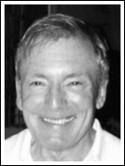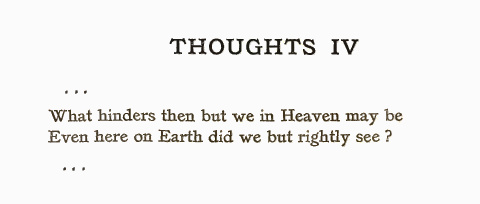| Capacitie |
|
| HOME NOWLETTER TRAHERNE DIALOGUE WREN-LEWIS HARDING SCHLOSS CONTACT |
|
John told me that he now experienced the world as a more gentle business, rather as though the world around is saying ‘Hello’ in an atmosphere of love.
(See NOWletter 144). Wren-Lewis John Wren-Lewis (c.1924 - 2006) was British by birth and education, a wartime graduate in applied mathematics from the Imperial College of Science in the University of London. He became internationally recognized as a scholar, author, lecturer and popular broadcaster during the 1950s and 60s, while following a professional career in research and R & D management with Britain’s largest multinational corporation, ICI, in which capacity he was an early pioneer of scientific futures studies. Publications in the fields of science, psychology, education and religion led to several Distinguished Visiting Lectureships on both sides of the Atlantic, and played a leading part in the so-called “Death of God” movement. In 1970 he became founding President of the British (now European) Association for Humanistic Psychology and began a new life partnership with dream psychologist Dr. Ann Faraday, researching altered states of consciousness.
In 1972 John left industry and England to become Visiting Professor of Religious Studies at New College, Sarasota, Florida, followed by several years as a “wandering scholar” in the Americas. In 1976 he and Ann settled in northern California where they lectured, led workshops and became part of the “spiritual community” at the Esalen Institute and in the Bay Area of San Francisco. A three-year pilgrimage to India and the Far East ended in 1983 on a Thai bus when Ann narrowly rescued John from manslaughter-by-poisoning. He was left with a radically changed consciousness which has remained with him ever since, bringing enormously increased quality of life. John and Ann wrote a book about this transformation of consciousness entitled The 9.15 to Nirvana - Confessions of a Reluctant Mystic. (The book was completed but never published). In 1992 John was appointed an Honorary Associate of the University of Sydney’s Department of Studies in Religion. John introduced Douglas Harding at a two-day, Sydney workshop I attended in 1991. One of the consequences was the combination of John's articles, which he edited himself, and then progressively added to the Wren-Lewis Archive page on this website. May 2022. |
||
|
Wren-Lewis Archive This list comprises articles by Professor John Wren-Lewis and Dr. Ann Faraday The Dazzling Dark, John Wren-Lewis. A near-death experience opens the door to a permanent transformation. Variety - the Spice of Enlightenment. A letter from John Wren-Lewis to “What is Enlightenment” magazine. Conversations with the Down-Under Mystic. An informal interview with John Wren-Lewis by Dan Sutera Originally published by The Self-Knowledge Symposium Foundation based on the three universities of North Carolina, USA. Communication Tongued with Fire, John Wren-Lewis. John Wren-Lewis personal reflections on the eternity-vision of T.S. Eliot's Four Quartets. Beyond Lucidity - A Personal Report , Ann Faraday. A personal report by Ann Faraday. My purpose in writing this note is to describe a very unusual sleep-experience of my own in October 1985 which casts new light on some of these issues discussed in Lucidity Letter such as the range of meanings which can be attached to the term 'lucidity', and possible relationships between lucid dreaming and meditation. Adam, Eve and Agatha Christie: Detective Stories, etc..., John Wren-Lewis. The extraordinary success of this rather ordinary well-made play is itself something of a mystery, and the detective in me has been stimulated to investigate. In so doing, I've been led into some rather deep waters of the human psyche, regions where psychology overlaps with anthropology and even theology – bringing some surprising insights about the underlying forces that make detective stories so fascinating, especially, it seems, to people with religious interests." Mellow Dramas in Paradise, Ann Faraday. Ann Faraday reviews contemporary teachers of Advaita, in particular Poonjaji and those claiming to be teaching with his endorsement and blessing. Dying to Live. Professor John Wren-Lewis on Susan Blackmore’s book Dying to Live: Science and the Near Death Experience (Harper Collins 1993). Joy Without a Cause. Rediscovering an Edwardian English Giant — A contemporary commentary on G. K. Chesterton by John Wren-Lewis.“Spike is best,” said the old man, opening his blue eyes blazing, “it sticks out&rdquo. That expresses the essence of my new consciousness better than a hundred theological terms—the discovery that things can be delightful even when the logic of ordinary life says they’re horrible, because their delight consists simply in the fact that they are what they are. Fearless. A movie masterpiece about transcendence. John Wren-Lewis reviews the film in the light of his own experience. “The wreckage we see in the film's opening shots is gruesome enough, but because Max is meant to be discovering progressively more in these flashbacks about what happened in the crash itself, each rerun shows progressively more of the howling destruction going on all around him as the plane breaks up, with no punches pulled and no detail spared. Yet far from aggravating fear of dying, the final effect is the absolute reverse. Weir has pulled of the incredible achievement of enabling viewers actually to feel for themselves how at such moments human consciousness can transcend fear, and indeed mortality itself, by moving out of time.” A Mystical Awakening. John Wren-Lewis John's autobiographical articlewritten for inclusion in Our Childhood’s Pattern, edited by Monica Furlong (London, Mowbrays 1995). Scepticism & Love - The Essential Mystical Counterpoint, John Wren-Lewis. In the year 1994 I had the very odd experience of finding myself quoted in new books by two authors who both claimed me as an ally yet seemed to be in total disagreement with each other. Unblocking a malfunction in consciousness, John Wren-Lewis. The hypothesis I've come up with is that the block which cuts off so-called normal human consciousness from its roots in that other, impersonal consciousness, is some kind of inflation or hyperactivity of the psychological survival-system. The Little Book of Life and Death by D. E. Harding with a Foreword by Ram Dass. New York & London: Arkana. 1988, 15Opp. Book Review by John Wren-Lewis. Dream Lucidity and Near-Death Experience: A Personal Report by John Wren-Lewis. By Computer & Spacecraft to God & Eternity, John Wren-Lewis. Essay-review of the The Physics of Immortality: Modern Cosmology, God and the Resurrection of the Dead by Frank Tipler. Macmillan, 1994. If you want to know what a real “new paradigm” scientific worldview might look like, as contrasted with the old-hat pseudo-scientific worldviews which often currently sail under the “new paradigm” flag, read this book by the professor of physics at Tulane University in New Orleans. The Implications of Near-Death Experiences for Understanding Posttraumatic Growth, John Wren-Lewis. Comment on piece by Tedeschi and Calhoun in Psychological Enquiry (Vol. 15, No. 1, 2004). The Serpent Rising: A Journey of Spiritual Seduction by Mary Garden (Sid Harta Publishers, Melbourne; Second Edition 2003). Reviewed by Ann Faraday. Notes on the feeling of being, mindful heart, etc., and the value of headlessness in providing a window on these matters; a means of demystifying Vijnanabhairava, Kokoro and Rasa. (Copies of contributions to NOWletters 48 and 152). |
||
|
Wren-Lewis Links External Links. The Dazzling Dark, an interview with John Wren Lewis by Caroline Jones on YouTube. John Wren-Lewis Wikipedia page. Articles by John Wren-Lewis available from the Journal of Humanistic Psychology. They can be downloaded in PDF format, charges apply. Death Knell of the Guru System?: Perfectionism Versus Enlightenment
Flesh-and-blood Buddha or Stained-Glass Saint? a Response to Gopal Abstract: The purpose of this response is to point out that Gopal (1995), in his reflections on my article, has (a) uncritically accepted the word of Krishnamurti's devotees as "more reliable" than the testimony of someone who could have known him much more closely, (b) misrepresented my article as an attack on Krishnamurti when it was plainly a defense, (c) attributed views to me that are the opposite of those I stated, and (d) proposed an assessment of spiritual progress that is clearly at variance with the very teaching by Krishnamurti that he quotes in support of it. A more sympathetic reading of Krishnamurti's life and work than mine would be hard to find. Other John Wren-Lewis Links of interest. Link to the two articles unblocking a malfunction in consciousness and The Dazzling Dark with a note about the author’s transforming experience.
A video conversation between John Wren-Lewis and U.G Krishnamurti. Other conversations between U.G. Krishnamurti, John Wren-Lewis, John Cooper & Donald Ingram Smith can be searched for and found on You Tube. An account of the "Realization of Emptiness" by Ann Faraday. The TAT Foundation. A rich source of articles on Awareness, gatherings and additional links. The TAT Foundation came about as a result of the life of Richard Rose and was founded on the conviction that our investigation of life's mysteries is expedited by working with others who are exploring, perhaps down a different road, so that we may share our discoveries, exchange ideas, and "compare notes" in order to come to a better understanding of ourself and others. |

